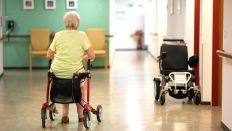Berlin elections in a nutshell - This is what happens on the 18th of September
There are elections on the 18th of September, but what are you actually voting for? What happens to your vote? Which issues are at stake? And how long do we have to wait until we can change it all again? Here is what you as a citizen have to know about your most powerful weapon – your vote. By Tina Friedrich
Every five years, Berlin elects its representatives at state level (Land) and at district level (Bezirk). Hence, the elections on September 18th are elections for the House of Representatives (Abgeordnetenhaus) as well as for the 12 district councils (Bezirksverordnetenversammlungen/BVV). These elections also mark the end of this legislation period and therefore also the end of Michael Müller's (SPD) term in office as Governing Mayor, as well as the end of the senator's and district mayor's terms in office. The new legislation period will last until the autumn of 2021. But there is no concrete date of election yet.
To enter the House of Representatives, a party must gather at least five percent of the vote; to enter the district council they must gather three percent. The state's election supervisor has admitted 21 parties to the election [Link in German]. In order to be admitted, parties not yet represented in the House had to collect a certain number of supporting signatures in due time.
What am I voting for?
In the election for the House of Representatives every eligible voter has two votes – a primary vote (Erststimme) to elect a candidate directly in his/her respective election district, (Direktkandidaten) and a secondary vote (Zweitstimme) to elect a party on the state level. On the district level voters can cast one vote for a party or a voters association in their respective districts. That's why everyone receives three ballot papers at the polling station.
The number of representatives in the House of Representatives changes with every legislation period. The results of the secondary votes, those for the parties, determine how 130 seats are distributed. This is the minimum number of representatives of which the parliament consists. Through the primary votes, candidates can be elected who would not have otherwise entered, e.g. because they are lower on the list or not on the list at all. Those are called "Überhangmandate". This way, a party can gather significantly more seats in parliament. In order to preserve the balance of power, additional seats will then be granted to other parties as well. In the district councils the number of seats can just decrease: If there are fewer candidates on the list than necessary according to the vote, those seats will remain empty.
Right now, the parliament consists of 149 representatives at state level and 55 legislators in each district council. Since 2011 a coalition of the Social Democrats (SPD) and Christian Democrats (CDU) has been in power. They put together the city government (Senat). First, Klaus Wowereit (SPD) was Governing Mayor; he resigned in August 2014. In December 2014, the SPD chose Michael Müller in a member's vote as his successor.
What issues are being discussed?
Each party published an election programme [Link in German]. Most of them focus on education, housing and security. rbb Abendschau did a survey together with Berliner Morgenpost in July [Link in German] to find out about the voter's interests.
36 percent of the respondents said that the parties' integration policy would be decisive for their vote. The second most important issue is social justice, a priority for 23 percent of the respondents. Education (17 percent) and housing (14 percent) follow in third and fourth, as well as security issues (11 percent) in fifth.
Finding affordable housing in Berlin is the most important issue at district level, according to research done by rbb. Gentrification – the displacement of lower-income households and established communities by rising rent prices – plays a major role in this respect. Administrative problems come second: ranging from district administration, to youth welfare service or problems with the building authorities – in short: everything that matters in your everyday life.
When do I vote?
Polling stations are open from 8 am to 6 pm on Sunday, September 18th. Afterwards, the votes are counted. This is public, so everybody can watch if interested.
All German citizens who have resided in Berlin since June 18th 2016 [Link in German] are eligible for the elections. Furthermore, those who want to elect the House of Representatives have to be at least 18 years old; and 16 years old at district level.
What will be influenced by my vote on the state level?
The elected House of Representatives has various tasks:
What can I influence on the district level?
On the district level, elected representatives are mainly responsible for communal services, i.e. local administration. Additionally, the district councils decide on urban planning concepts, they are concerned with youth welfare services and responsible for the district's budget (which is to be confirmed by the House of Representatives).
District politicians also decide, for example if certain neighbourhoods are to be preserved (Milieuschutz). In those areas luxury restorations have to be approved, as well as the integration of apartments and the transformation of rented housing into owned housing. This is done in order to keep rents on a lower level and neighbourhoods diverse. For example, most recently the district council of Mitte put five areas under the neighbourhood protection program.
District councils also elect the district administrative body. Currently it consists of the district mayor and four councillors. This time abstentions aren't counted. The district administration (Bezirksamt) is the only executive administrative body in a district.






